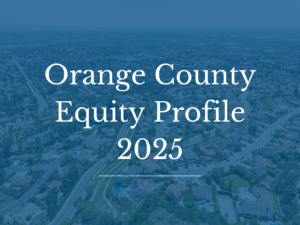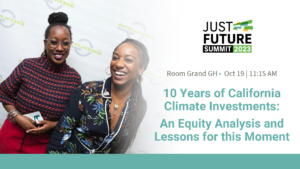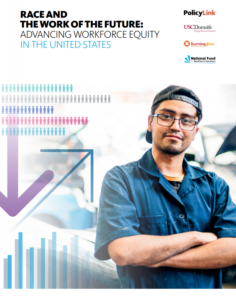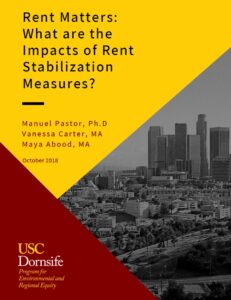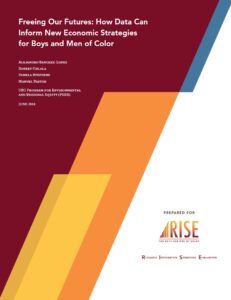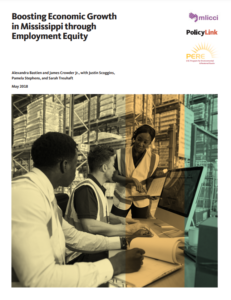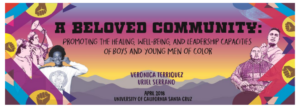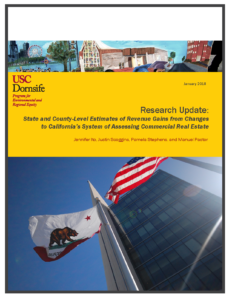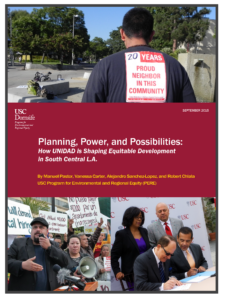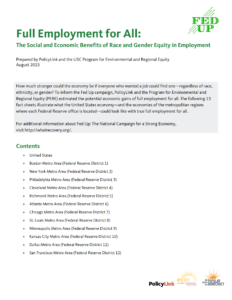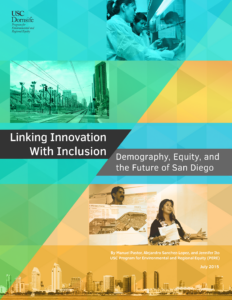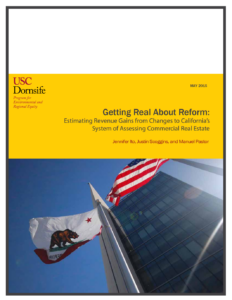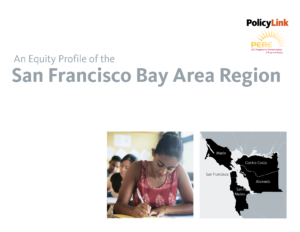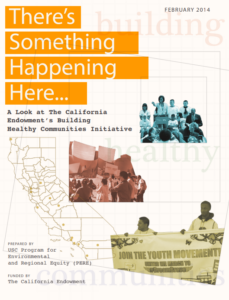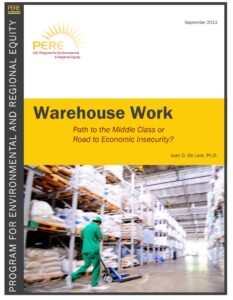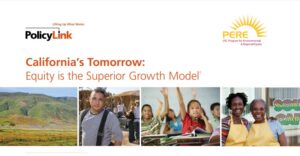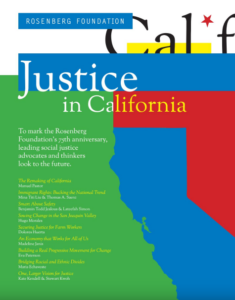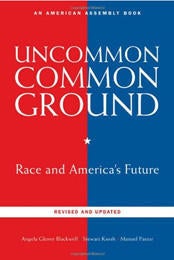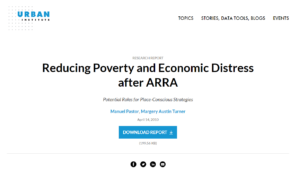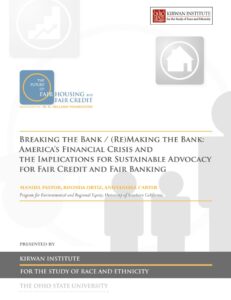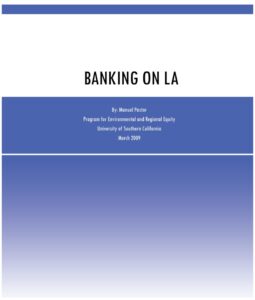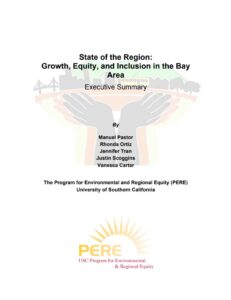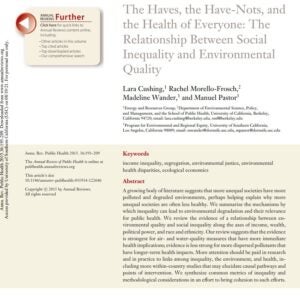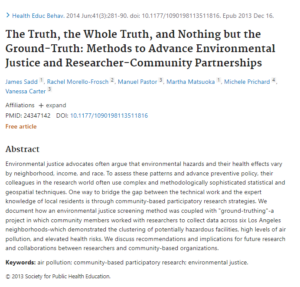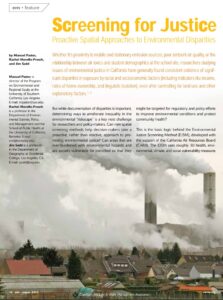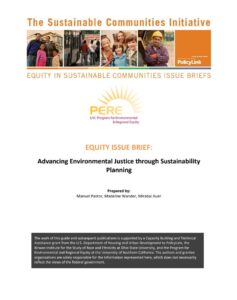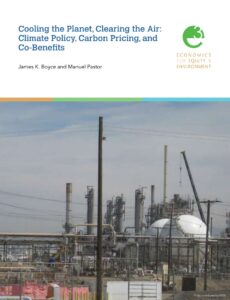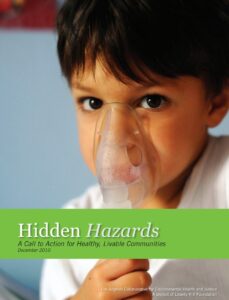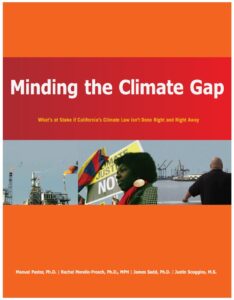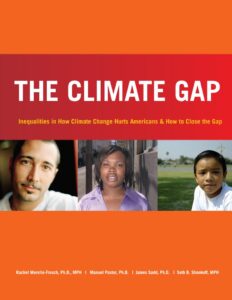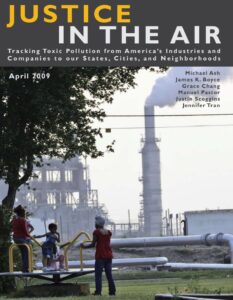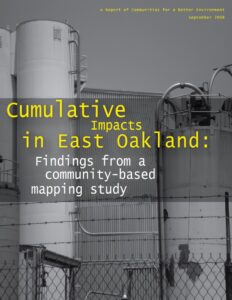Economic Inclusion & Climate Equity Reports
New publications
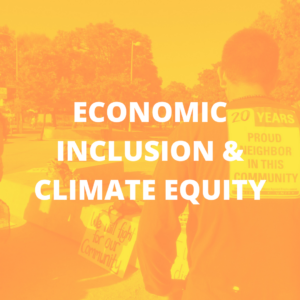
Recent reports (from 2020 to present)
Equity Matters 2024: The Central Coast Regional Equity Initiative
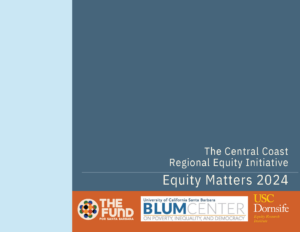 March 2025
March 2025
By Fund for Santa Barbara, the UCSB Blum Center on Poverty, Inequality, and Democracy, and the USC Equity Research Institute
This research project aims to deepen our understanding of regional disparities, foster meaningful dialogue, and inform strategies that advance social, health, environmental, and economic equity. This is an update of our Towards a Just and Equitable Central Coast (2021) which deepened our understanding of regional disparities, facilitated a region-wide conversation, and supported the planning and implementation of initiatives focused on advancing social, health, environmental, and economic equity.
Orange County Equity Profile 2025
By the USC Equity Research Institute in partnership with Orange County Grantmakers
Orange County’s economy is stronger than the nation as a whole; however, economic and racial/ethnic disparities threaten future growth and prosperity. The Orange County Equity Profile 2025 is a refresh of Orange County Grantmakers’ 2019 Equity Profile. It highlights demographic trends and indicators of equitable growth for measuring progress in closing gaps in outcomes by race/ethnicity, nativity, and other characteristics.
A Call to Invest in Community Power: Lessons from 10 Years of California Climate Investments for the State and the Nation
By the USC Equity Research Institute and The Greenlining Institute
The California Climate Investments (CCI) are turning 10. After a decade of investments and nearly $10 billion implemented throughout the state, is CCI delivering on its promise? Does it drive benefits to environmental justice communities that are the most vulnerable to pollution, have the fewest resources to adapt to climate change, and the least political power to attract these dollars? Do these communities feel the impact of these dollars? In this report, we strive to answer these questions, particularly in light of unprecedented federal funding for climate investments.
The Uneven Geography of Opportunity for Asian Americans and Pacific Islanders in Metro America
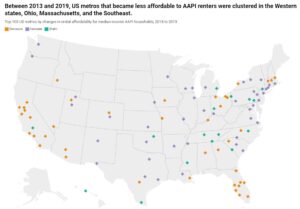 April 27, 2023
April 27, 2023
By Ryan Fukumori, Edward-Michael Muña, Vanessa Garcia, and Jennifer Tran
In May 2022, the National Equity Atlas team released The Shrinking Geography of Opportunity in Metro America, a report that explored the landscape of housing affordability in the United States by race. The data and analysis illustrated the growing gap in access to affordable housing and opportunity-rich neighborhoods for working-class, Black, and Latinx renters from 2013 to 2019. Explore the data dashboard.
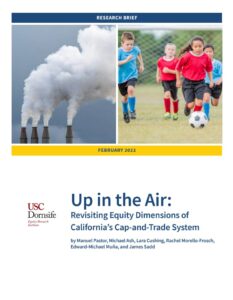 Up in the Air: Revisiting Equity Dimensions of California’s Cap-and-Trade System
Up in the Air: Revisiting Equity Dimensions of California’s Cap-and-Trade System
February 1, 2022
By Manuel Pastor, Michael Ash, Lara Cushing, Rachel Morello-Frosch, Edward-Michael Muna, and James Sadd
California’s cap-and-trade program is a key strategy for achieving reductions in greenhouse gas (GHG) emissions under AB32, the California Global Warming Solutions Act. While there are many equity considerations with regard to cap-and-trade, including the ways in which funds collected and disbursed, one point of controversy between proponents and critics of cap-and trade systems is whether they can ameliorate or exacerbate disparities in exposure to co-pollutants.
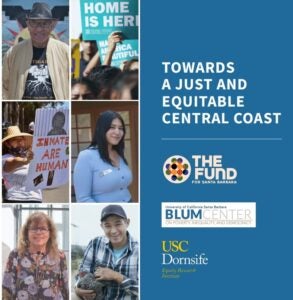 Towards a Just and Equitable Central Coast
Towards a Just and Equitable Central Coast
December 2021
The Fund for Santa Barbara, UCSB Blum Center on Poverty, Inequality, and Democracy, and the USC Equity Research Institute
The Fund for Santa Barbara, in partnership with the UCSB Blum Center on Poverty, Inequality, and Democracy, and the USC Equity Research Institute launched the first Central Coast Regional Equity Study over the course of 2020-21. The goal of this research project is to deepen our understanding of regional disparities, facilitate a region-wide conversation, and support the planning and implementation of initiatives focused on advancing social, health, environmental, and economic equity. Covering Santa Barbara and Ventura counties, the study is designed to yield a periodically updated equity database, of use for teaching, research, policy, and action. The initial data compilation component of this two-county regional project was initiated in the summer of 2020.
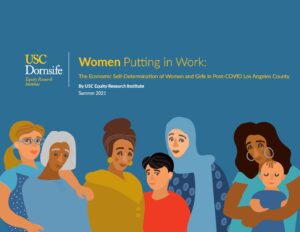 Women Putting in Work: The Economic Self-Determination of Women and Girls in Post-COVID Los Angeles County
Women Putting in Work: The Economic Self-Determination of Women and Girls in Post-COVID Los Angeles County
Summer 2021
By USC Equity Research Institute
Women Putting in Work creates a baseline of understanding of women in LA County during the COVID-19 pandemic. Women and girls have always been in a more precarious position, especially if they are women of color, immigrants, gender non-conforming, or hold other marginalized identities. This report both identifies the systemic inequities holding women back, in conversation with their resilience. Ultimately, it offers a set of recommendations for how to change policy so that women are not required to be resilient – so that they live in a world that sees them and supports them.
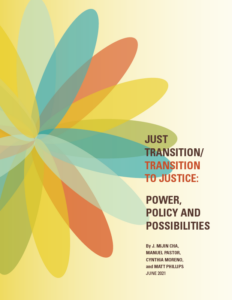 Just Transition/Transition to Justice: Power, Policy and Possibilities
Just Transition/Transition to Justice: Power, Policy and Possibilities
By J. Mijin Cha, Manuel Pastor, Cynthia Moreno, and Matt Phillips
June 2021
This report looks at this process of power building for just transition in four states: California, Kentucky, Louisiana, and New York. We combine an analysis of the pillars of just transition – strong governmental support, dedicated funding streams, diverse coalitions, and economic diversification – with an analysis of how to change power at a state level that focuses on the conditions that impact possibilities, the community-level capabilities that facilitate effective voice, and the arenas in which power is contested. Ultimately, the fight for a just transition is a fight for justice. And, while we know it will be hard and long, the stories we heard showed how advocates and organizers, often in the face of great odds, come together and force the change that makes people’s lives better.
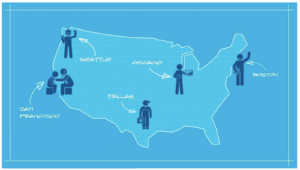 National Equity Atlas
National Equity Atlas
Advancing Workforce Equity: A Blueprint for Regional Action in Five U.S. Cities
January 26, 2021
As our nation faces overlapping and interconnected public health, economic, and racial justice crises, it is more important than ever that we redesign workforce strategies for a more resilient and inclusive economy. In partnership with Burning Glass Technologies, the National Fund for Workforce Solutions, and local leaders, and with support from JPMorgan Chase, we released five reports on the state and future of workforce equity in Boston, Chicago, Dallas, the San Francisco Bay Area, and Seattle.
The reports are part of the Advancing Workforce Equity project. We worked closely with local leaders to analyze tailored data, identify the key drivers of inequity, and prioritize actionable strategies to advance equity through their policy efforts, programs, and investments. This series of reports will serve as the basis for long-term equity-focused efforts.
Informed by our data analysis, local collaboratives developed tailored, ground-up strategies to advance workforce equity in their regions by dismantling barriers to entry and advancement in the labor market, reducing occupational segregation, building worker power, and improving job quality for all.
- Boston, in partnership with SkillWorks
- Chicago, in partnership with the Chicagoland Workforce Funder Alliance
- Dallas and Collin Counties, Texas, in partnership with Pathways to Work
- San Francisco Bay Area, in partnership with ReWork the Bay
- Seattle, in partnership with the Workforce Development Council of Seattle-King County
Race and The Work of the Future: Advancing Workforce Equity in the United States
November 2020
By Abbie Langston, Justin Scoggins, and Matthew Walsh
PolicyLink, USC Equity Research Institute, Burning Glass Technologies, and the National Fund for Workforce Solutions
In the wake of the coronavirus pandemic, massive job losses, rapidly evolving business models, and accelerating technological change are dramatically reshaping the US economy. This report, produced in partnership with Burning Glass Technologies and the National Fund for Workforce Solutions, provides a comprehensive analysis of long-standing racial gaps in labor market outcomes, the economic impacts of COVID-19, and the racial equity implications of automation. It provides an in-depth analysis of disaggregated equity indicators and labor market dynamics, finding that White workers are 50 percent more likely than workers of color to hold good jobs and that eliminating racial inequities in income could boost the US economy by $2.3 trillion a year. In addition to detailed data analysis on the state of racial inequities in jobs and opportunity, the report offers a bold framework for action to advance workforce equity, where racial income gaps have been eliminated, all jobs are good jobs, and everyone who wants to work has access to family-supporting employment.
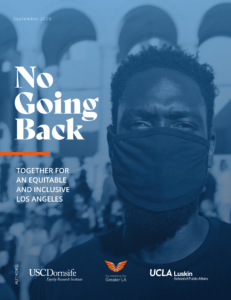 No Going Back: Together for an Equitable and Inclusive Los Angeles
No Going Back: Together for an Equitable and Inclusive Los Angeles
September 2020
By the USC Equity Research Institute, Committee for Greater LA, and the UCLA Luskin School of Public Affairs
Prior to the stay-at-home public health directive, civic boosters promoted Los Angeles as a metropolis that was confronting its problems and making progress. Local and state governments enjoyed budget surpluses, unprecedented investments were committed by Angelenos to respond to homelessness, and access to health care and high school graduation rates were at historically high levels, while unemployment and crime rates were at celebrated lows. But behind this glossy view of LA, a closer look at the data would have revealed a very different reality, where decades of structural and systemic racism resulted in significant social, economic, and racial inequality. Just a few months into a global pandemic, the cracks in the broken systems have become gaping holes, widening each day. Today, the calls for systemic change are loud, consequential and urgent.
Early in the response to the COVID-19 pandemic, ten foundations wisely convened a diverse group of community, civic, non-profit, labor and business leaders to identify the systemic issues emerging from the crisis and to offer up a blueprint for building a more equitable and inclusive LA. Their past philanthropic work had made it clear that Los Angeles was becoming increasingly inequitable, and they feared the acceleration of disparate impact centered on income and race. The Committee for Greater LA was formed, and for the past five months, it has steered the analytical work completed by two of LA’s leading institutions, UCLA and USC, supported by a team of consultants. The report that follows reflects our discourse, analysis and discovery.
Getting Real about Reform II: Estimating Revenue Gains from Changes to California’s System of Assessing Commercial Real Estate
When we first released Getting Real About Reform in 2015, we presented a methodology for estimating county-level tax revenue gains from a change in law to assess commercial/industrial properties at market value in California. We subsequently updated the analysis in 2018, and here we update it again in 2020—the year an initiative will be on the November ballot to make such a change in law. While we build on the methods developed in that earlier work, we use here more recent data and alter our assumptions around average annual growth rates for both assessed value and market value to reflect likely market conditions. We then project our baseline estimates forward to 2021-22, and offer an estimate of the revenue implications for the Golden State and its diverse 58 counties under a system that assesses commercial and industrial property based on market rather than acquisition value. That analysis suggests a shift to market value assessment on the commercial and industrial side could yield 10.3 to 12.6 billion dollars statewide in additional property tax revenue.
PERE Regional Equity reports (2009 to 2019)
From 2008 to 2019, ERI published economic inclusion reports under our previous name, the USC Program for Environmental and Regional Equity (PERE). These regional equity-focused publications are listed below in reverse chronological order.
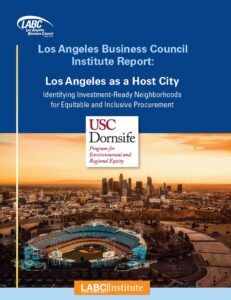 Los Angeles Business Council Institute Report: Identifying Investment-Ready Neighborhoods for Equitable and Inclusive Procurement Los Angeles as a Host City
Los Angeles Business Council Institute Report: Identifying Investment-Ready Neighborhoods for Equitable and Inclusive Procurement Los Angeles as a Host City
November 2019
By Sabrina Kim, Arpita Sharma, Ashley Thomas, Jennifer Ito, and Manuel Pastor
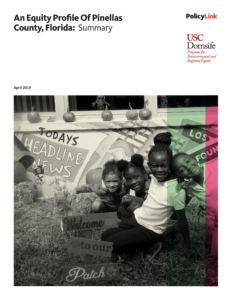 An Equity Profile of Pinellas County
An Equity Profile of Pinellas County
April 17, 2019
By PolicyLink and the USC Program for Environmental & Regional Equity (PERE)
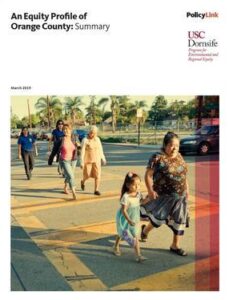 An Equity Profile of Orange County
An Equity Profile of Orange County
March 26, 2019
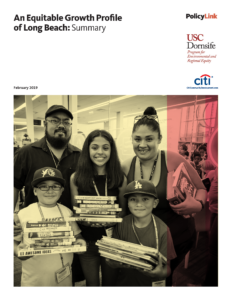 Equitable Growth Profile of the City of Long Beach
Equitable Growth Profile of the City of Long Beach
February 4, 2019
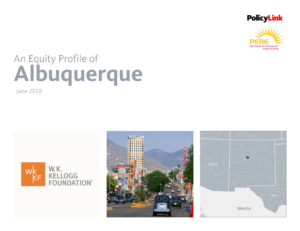 An Equity Profile of Albuquerque
An Equity Profile of Albuquerque
June 19, 2018
By PolicyLink and the USC Program for Environmental & Regional Equity (PERE)
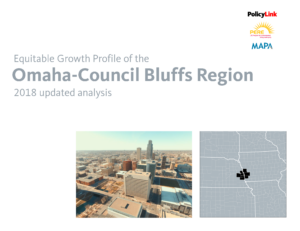 Equitable Growth Profile of the Omaha-Council Bluffs Region
Equitable Growth Profile of the Omaha-Council Bluffs Region
June 6, 2018
By PolicyLink and the USC Program for Environmental & Regional Equity (PERE)
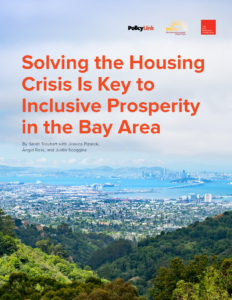 Solving the Housing Crisis Is Key to Inclusive Prosperity in the Bay Area
Solving the Housing Crisis Is Key to Inclusive Prosperity in the Bay Area
April 10, 2018
By PolicyLink and the USC Program for Environmental & Regional Equity (PERE)
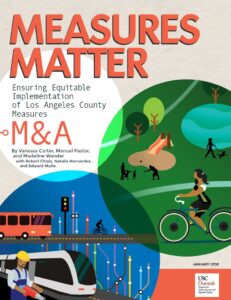 Measures Matter: Equitable Implementation of Los Angeles County Measures M & A
Measures Matter: Equitable Implementation of Los Angeles County Measures M & A
January 2018
Authors: Vanessa Carter, Manuel Pastor, Madeline Wander
Contributors: Robert Chlala, Natalie Hernandez, Edward Muna
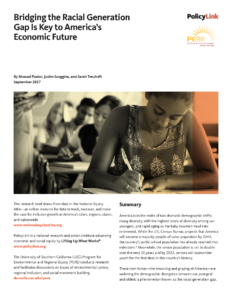 Bridging the Racial Generation Gap Is Key to America’s Economic Future
Bridging the Racial Generation Gap Is Key to America’s Economic Future
September 5, 2017
By Manuel Pastor, Justin Scoggins, and Sarah Treuhaft
PolicyLink and the USC Program for Environmental & Regional Equity (PERE)
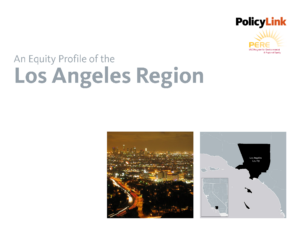 An Equity Profile of the Los Angeles Region
An Equity Profile of the Los Angeles Region
March 2017
By the USC Program for Environmental and Regional Equity (PERE) and PolicyLink
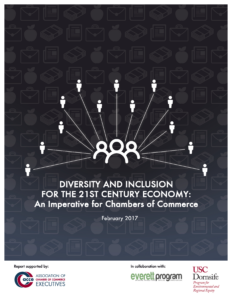 Diversity and Inclusion for the 21st Century Economy: An Imperative for Chambers of Commerce
Diversity and Inclusion for the 21st Century Economy: An Imperative for Chambers of Commerce
February 2017
By Chris Benner of the Everett Program at UCSC and Manuel Pastor of the Program for Environmental and Regional Equity (PERE) at USC
In collaboration with the Association of Chamber of Commerce Executives (ACCE)
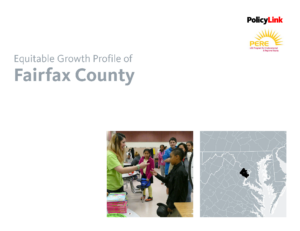 Equitable Growth Profile for Fairfax County, VA
Equitable Growth Profile for Fairfax County, VA
June 18, 2015
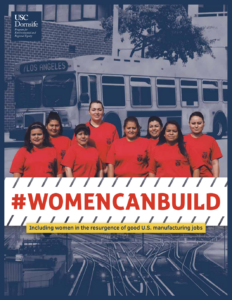 #WomenCanBuild: Including Women in the Resurgence of Good U.S. Manufacturing Jobs
#WomenCanBuild: Including Women in the Resurgence of Good U.S. Manufacturing Jobs
April 2015
By Manuel Pastor and Jared Sanchez
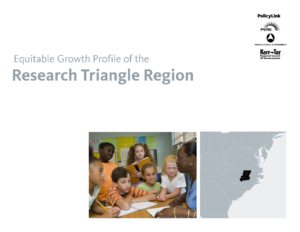 Equitable Growth Profile of the Research Triangle Region
Equitable Growth Profile of the Research Triangle Region
March 31, 2015
By PolicyLink and the USC Program for Environmental & Regional Equity (PERE)
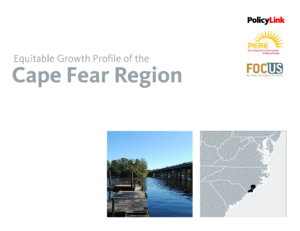 Equitable Growth Profile of the Cape Fear Region
Equitable Growth Profile of the Cape Fear Region
February 11, 2015
By PolicyLink and the USC Program for Environmental & Regional Equity (PERE)
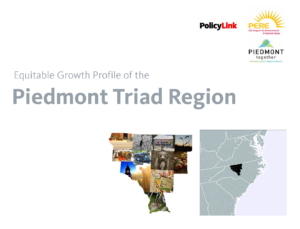 Equitable Growth Profile of the Piedmont Triad Region
Equitable Growth Profile of the Piedmont Triad Region
December 4, 2014
By PolicyLink and the USC Program for Environmental & Regional Equity (PERE)
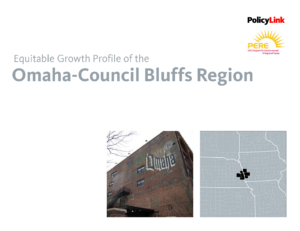 Equitable Growth Profile of the Omaha-Council Bluffs Region
Equitable Growth Profile of the Omaha-Council Bluffs Region
December 2, 2014
By PolicyLink and the USC Program for Environmental & Regional Equity (PERE)
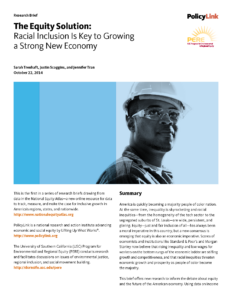 The Equity Solution: Racial Inclusion is Key to Growing a Strong New Economy
The Equity Solution: Racial Inclusion is Key to Growing a Strong New Economy
October 22, 2014
By PolicyLink and the USC Program for Environmental & Regional Equity (PERE)
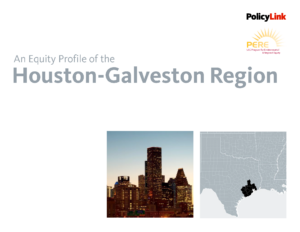 An Equity Profile of the Houston-Galveston Region
An Equity Profile of the Houston-Galveston Region
October 14, 2014
By PolicyLink and the USC Program for Environmental & Regional Equity (PERE)
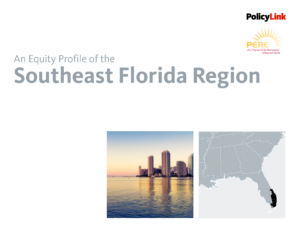 An Equity Profile of the Southeast Florida Region
An Equity Profile of the Southeast Florida Region
June 11, 2014
By PolicyLink and the USC Program for Environmental & Regional Equity (PERE)
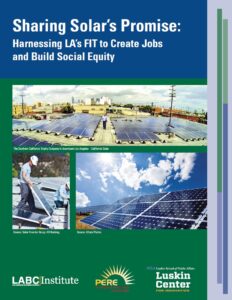 Sharing Solar’s Promise: Harnessing LA’s FiT to Create Jobs and Build Social Equity
Sharing Solar’s Promise: Harnessing LA’s FiT to Create Jobs and Build Social Equity
April 2014
By USC PERE and UCLA Luskin Center
conducted on behalf of the Los Angeles Business Council Institute
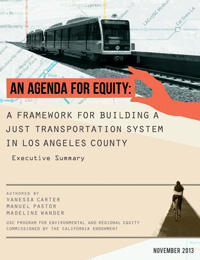 An Agenda for Equity: A Framework for Building a Just Transportation System in Los Angeles County
An Agenda for Equity: A Framework for Building a Just Transportation System in Los Angeles County
November 2013
By Vanessa Carter, Manuel Pastor, and Madeline Wander
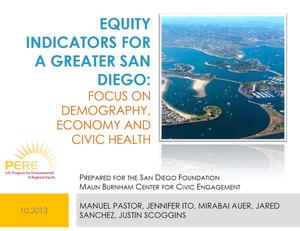 Equity Indicators for a Greater San Diego: Focus on Demography, Economy, and Civic Health
Equity Indicators for a Greater San Diego: Focus on Demography, Economy, and Civic Health
October 2013
By Manuel Pastor, Jennifer Ito, Mirabai Auer, Jared Sanchez, and Justin Scoggins
Prepared for The San Diego Foundation’s Center for Civic Engagement
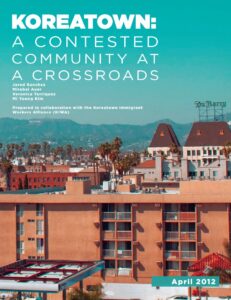 Koreatown: A Contested Community at a Crossroads
Koreatown: A Contested Community at a Crossroads
April 2012
By Jared Sanchez (USC PERE), Mirabai Auer (USC PERE), Veronica Terriquez (USC), and Mi Young Kim (KIWA)
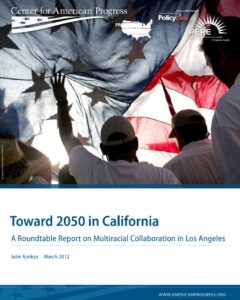 Toward 2050 in California: A Roundtable Report on Multiracial Collaboration in Los Angeles
Toward 2050 in California: A Roundtable Report on Multiracial Collaboration in Los Angeles
March 2012
The Center for American Progress, PolicyLink, and the USC Program for Environmental & Regional Equity (PERE)
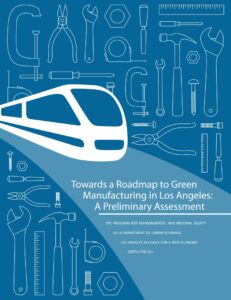 A Roadmap to Green Manufacturing in Los Angeles: Policies, Planning, and Partnerships for Quality Jobs
A Roadmap to Green Manufacturing in Los Angeles: Policies, Planning, and Partnerships for Quality Jobs
January 2012
Research Team: By the USC Program for Environmental & Regional Equity (PERE), UCLA Department of Urban Planning, Los Angeles Alliance for a New Economy and Green for All
Empowering LA’s Solar Workforce: New Policies that Deliver Investments and Jobs 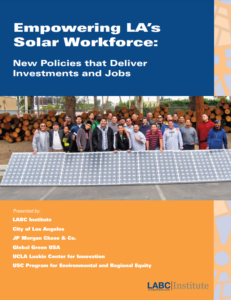
November 2011
By JR DeShazo, UCLA Luskin Center; Manuel Pastor, USC PERE; and Mirabai Auer, USC PERE
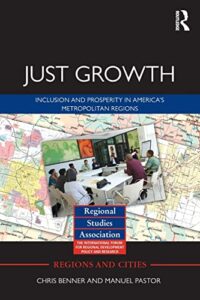 Just Growth: Inclusion and Prosperity in America’s Metropolitan Regions
Just Growth: Inclusion and Prosperity in America’s Metropolitan Regions
Chris Benner
Associate Professor, Community and Regional Development
Executive Committee, Center for Regional Change
University of California, Davis
Manuel Pastor Jr.
Professor, American Studies & Ethnicity and
Director, Program for Environmental and Regional Equity
University of Southern California
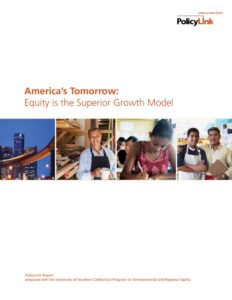 America’s Tomorrow: Equity is the Superior Growth Model
America’s Tomorrow: Equity is the Superior Growth Model
November 2011
By Sarah Treuhaft (PolicyLink), Angela Glover Blackwell (PolicyLink), and Manuel Pastor (USC PERE)
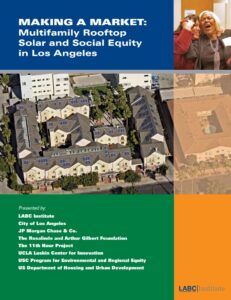 Making a Market: Multifamily Rooftop Solar and Social Equity in Los Angeles
Making a Market: Multifamily Rooftop Solar and Social Equity in Los Angeles
April 2011
By JR DeShazo, Director, UCLA Luskin Center for Innovation; Manuel Pastor, Director, USC Program for Environmental and Regional Equity (USC PERE); Mirabai Auer, USC PERE; Vanessa Carter, USC PERE; Nicholas Vartanian, UCLA Luskin Center for Innovation
State of the Region: Growth, Equity, and Inclusion in the Bay Area
December 2008
By Manuel Pastor, Rhonda Ortiz, Jennifer Tran, Justin Scoggins, and Vanessa Carter
PERE Environmental Justice reports (2009-2019)
From 2008 to 2019, ERI published climate equity reports under our previous name, the USC Program for Environmental and Regional Equity (PERE). These environmental justice-focused publications are listed below in reverse chronological order.
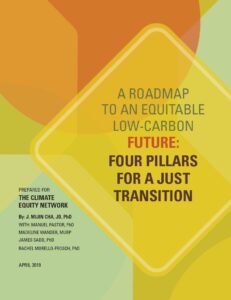 A Roadmap to an Equitable Low-Carbon Future: Four Pillars for a Just Transition
A Roadmap to an Equitable Low-Carbon Future: Four Pillars for a Just Transition
April 2019
By J. Mijin Cha
With: Manuel Pastor, Madeline Wander, James Sadd, and Rachel Morello-Frosch
Prepared for the Climate Equity Network
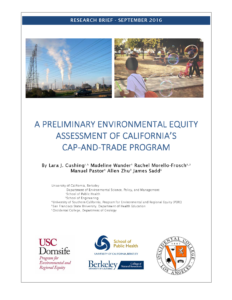 A Preliminary Environmental Equity Assessment of California’s Cap-and-Trade Program
A Preliminary Environmental Equity Assessment of California’s Cap-and-Trade Program
September 2016
By Lara J. Cushing, Madeline Wander, Rachel Morello-Frosch, Manuel Pastor, Allen Zhu, and James Sadd
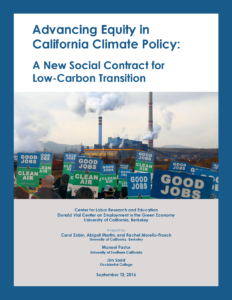 Advancing Equity in California Climate Policy: A New Social Contract for Low-Carbon Transition
Advancing Equity in California Climate Policy: A New Social Contract for Low-Carbon Transition
September 2016
By Carol Zabin, Abigail Martin, and Rachel Morello-Frosch (University of California, Berkeley); Manuel Pastor (University of Southern California); and Jim Sadd (Occidental College)
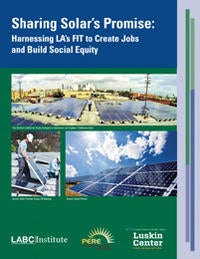 Sharing Solar’s Promise: Harnessing LA’s FiT to Create Jobs and Build Social Equity
Sharing Solar’s Promise: Harnessing LA’s FiT to Create Jobs and Build Social Equity
April 2014
A joint project of USC PERE and the UCLA Luskin Center study conducted on behalf of the Los Angeles Business Council Institute
The Truth, the Whole Truth, and Nothing but the Ground-Truth: Methods to Advance Environmental Justice and Researcher-Community Partnerships
December 2013
By James Sadd, Rachel Morello-Frosch, Manuel Pastor, Martha Matsuoka, Michele Prichard, and Vanessa Carter
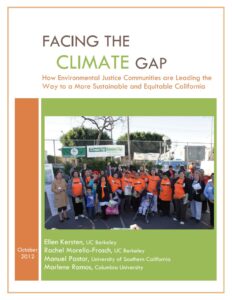 Facing the Climate Gap: How Environmental Justice Communities are Leading the Way to a More Sustainable and Equitable California
Facing the Climate Gap: How Environmental Justice Communities are Leading the Way to a More Sustainable and Equitable California
October 2012
By Ellen Kersten, UC Berkeley; Rachel Morello-Frosch, UC Berkeley; Manuel Pastor, University of Southern California; and Marlene Ramos, Columbia University
 Near-roadway pollution and childhood asthma: Implications for developing ‘win-win’ compact urban development and clean vehicle strategies
Near-roadway pollution and childhood asthma: Implications for developing ‘win-win’ compact urban development and clean vehicle strategies
September 2012
Environmental Health Perspectives
By Laura Perez, Fred Lurmann, John Wilson, Manuel Pastor, Sylvia J. Brandt, Nino Künzli, and Rob McConnell
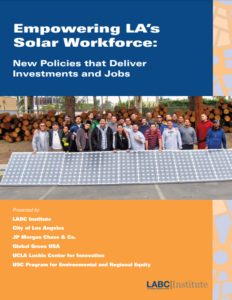 Empowering LA’s Solar Workforce: New Policies that Deliver Investments and Jobs
Empowering LA’s Solar Workforce: New Policies that Deliver Investments and Jobs
November 2011
By JR DeShazo, UCLA Luskin Center; Manuel Pastor, USC PERE; and Mirabai Auer, USC PERE
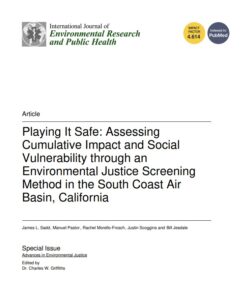 Playing It Safe: Assessing Cumulative Impact and Social Vulnerability through an Environmental Justice Screening Method in the South Coast Air Basin, California
Playing It Safe: Assessing Cumulative Impact and Social Vulnerability through an Environmental Justice Screening Method in the South Coast Air Basin, California
May 2011
By James L. Sadd, Manuel Pastor, Rachel Morello-Frosch, Justin Scoggins, and Bill Jesdale
Justice in the Air: Tracking Toxic Pollution from America’s Industries and Companies to Our States, Cities, and Neighborhoods
April 2009
By Michael Ash, James K. Boyce, Grace Chang, Manuel Pastor, Justin Scoggins, and Jennifer Tran[Ash, Boyce, and Chang are from the Political Economy Research Institute (PERI) at the University of Massachusetts, Amherst; Pastor, Scoggins, and Tran are from the Program for Environmental and Regional Equity (PERE) at the University of Southern California]
